Hey, all, to another Sunday Summaries. I think I have the structure down pat at this point, though that isn't to say this feature won't morph and change as the weeks go by. It does seem to get longer each time, which is a troubling development because I'm spending that much more of my Sundays to produce them. My chief regret this week is that I neglected to write anything else beyond the regular "List of Beaten Games" for this year. However, now that I've escaped the irradiated clutches of Bethesda's Fallout 4, I'll be playing some new games which in turn will hopefully inspire new topics of discussion. If nothing else, I won't have the Commonwealth sitting there distracting me with its promises of looting garbage from ruined dumps. The garbage; it calls to me.
I've been meaning to watch the last two episodes of Heroes Reborn - the series finale is this Friday - but I just can't seem to muster the motivation to do so. I've been recapping the episodes over on my Tumblr, which is a kinder way of saying eviscerating them, but the primary issue with the show is that it's sort of dull and predictable. To be a fun terrible show, it has to surprise you in ways that make little sense cohesively and/or contains wonderfully terrible and misguided ideas that go against everything the show has established about its characters, their journeys and general standards of basic human decency and decorum.
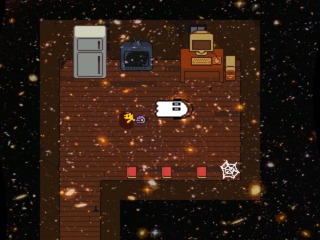
We're also getting to the point now where there's simply too much good TV that I'm missing out on to crack wise about the bad, and that factors into something I was pondering on Twitter the other day about video games as well: we almost have too much of a good thing right now with the competing AAA and Indie markets and we really lack the time to subject ourselves to media that doesn't deserve it. We're in an era where, and I feel the emergence of the oft-maligned and ever-effusive YouTubers and Twitch stream game coverage corroborates this, one could feasibly focus their whole "discussing games" careers talking positively about the games they enjoyed and feel could use the friendly promotion to boost their profile. It's when when there's a lot of money behind the promotional pushes of big AAA games that, were one to be a little cynical, could connect a positive review to some sort of media blitz if not a paid endorsement outright - the recent Rooster Teeth debacle over Jeff's firm but fair Fallout 4 console review is one of the uglier instances of this. On the other hand, the Indie market is proving itself the new bastion of innovation and giving players what they want instead of telling them what they want (like consumable DLC cards for multiplayer and season passes) and will continue to outpace the increasingly desperate and less scrupulous corporations, and they need all the help they can to stand out. A decent YouTube channel - as in, the ones that don't resort to shrieking histrionics while playing terrible horror games crapped out almost entirely for such videos - can really get the word out about some cool shit. Ditto with Giant Bomb and other gaming sites that have gone the personality route: we're reasonably assured that the enthusiasm for these under-the-radar games is genuine, because we know what the hosts are into.
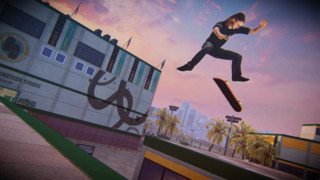
It's equally important to get the word out about terrible and broken games too, of course, if only to save folk from an unwise purchase. The critic's job is to sort the chaff from the wheat for the sake of those who don't have the time or money to do so themselves. If your online persona isn't towards tearing things down or creating similes about how much of a garbage fire a game might be, however, there's venues and opportunities for rising critics now where they can be eternally positive and ebullient when talking about games without falling into the trap of coming off like a weighted IGN-style "8-to-10" point scoring system that no discerning consumer would take seriously. Just as long as we don't ignore the "accentuate the negative" critics either: if those terrible games aren't given the withering limelight from time to time, then it's the publishers themselves that end up controlling the message.
Oh yeah! One last thing before I move onto new releases for this week: the first ninety minutes of the Gaki no Tsukai New Year's No-Laughing Batsu ("Punishment") Game have been translated. If you're unfamiliar, it's a big annual event on Japanese TV where a group of five comedians have to go an entire day without laughing, or they'll get their asses beat with giant foam weapons. It's a TV institution over there equivalent to Dick Clark (or posthumous replacement) dropping the shiny New Year's ball over Times Square and worth a watch, even if most of the cameos and jokes tend to go over the heads of those not fully entrenched in Japanese pop culture. I've been a little disappointed with how formulaic and gross it's been in recent years - they regularly introduce a fake game show segment where someone's ass is gradually pushed into the trapped faces of the comedians, among other scatological humor - but it can be hilariously inventive in how it traps and surprises the comedians in equal measure too. If you've never seen a Batsu Game, check out one of the fully translated shows from previous years on the site I linked to. They're a bit on the long side, but it's one of those things I treasure experiencing every January.
News!
Releases are picking up again, though it'll be a long while before I buy anything new. Still, it doesn't hurt to review what's on its way for future purchasing ideas. Fortunately, I can talk about the new games of this week with some authority because half of them are rereleases.
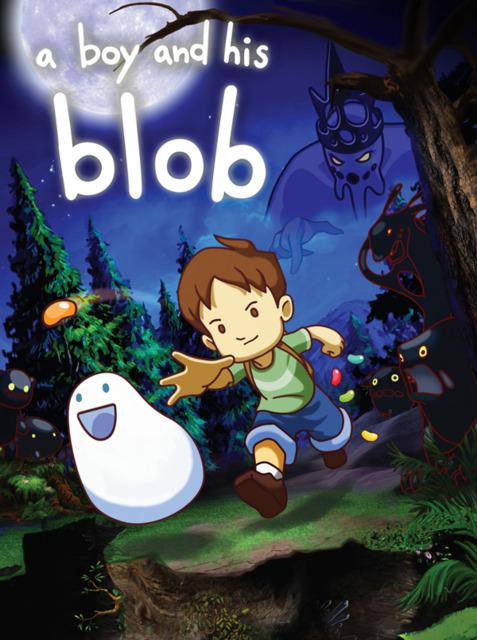
First is the A Boy and His Blob rerelease: one of the Wii's handful of worthy third-party exclusives. Well, exclusive until now, anyway. I've written about the Wii's hiddentreasure trove of exclusives twice before now - hidden if only because they're buried under piles of shovelware or overshadowed by Nintendo's first-party output - and I'm happy to see a lot more of those games find a wider audience. I didn't play the PS Vita version of Little King's Story, but if has anything like the quality of the original than it's one of the Vita's most essential games. I'm sure the same will be true for this A Boy and His Blob remake as well: it has astoundingly smooth art and animation (WayForward can do non-pixel art just as well as pixel art, it turns out), some really diabolical puzzles and a whole lot of heart. Y'all remember the hug button, right?
More important than that in rerelease news, however, is the PS4 PSN release of Dark Cloud 2: one of the many links in Level-5's chain of fantastic JRPGs for the PlayStation 2. Dark Cloud 2, or Dark Chronicle, happens to be the best of these for reasons I hope to go into at a later time. It's genuinely my favorite game of all time, and it's through a combination of gameplay mechanics, diverse modes and side activities, its gentle and chill presentation and is one of those JRPGs that I can get 100 hours into and still wake up eager to play more of it. I intend to buy it as soon as possible, if only to support the choice to release it on the PS4, and whenever I can make a space in the backlog I'm thinking of jumping right back into it again with abandon.
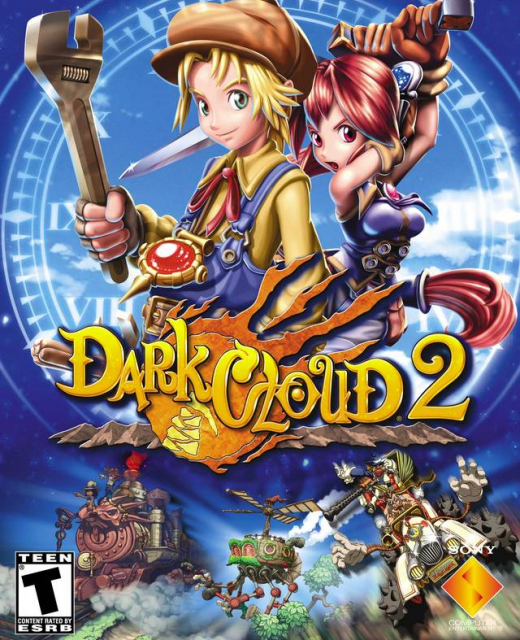
We also have the "final" 1.0 release of Darkest Dungeon, which looks to do to roguelike dungeon crawlers what Papers, Please did for bureaucracy simulators; Mario & Luigi: Paper Jam, the newest Mario & Luigi RPG and one that features Paper Mario, which I hope ends up being a great combination of the two brilliant and long-running Mario-related RPG series; and Atelier Escha & Logy Plus: Alchemists of the Dusk Sky, part of the very expansive Atelier franchise - and another "revamp" of an earlier PS3 game in the series - for PS4 and Vita. I actually feel bad every time a new one of those comes out, because I only got as far as Atelier Iris 2: there's been approximately twelve new games in the series since then. It sounds like the "Plus" games are the ones to go for, though, as they include the enhancements and gameplay additions introduced in the intervening games for an incrementally improved experience. It'd be like Capcom remaking Resident Evil 1 to be bigger and better with the knowledge they'd garnered from creating Resident Evil 4 which... I guess they sort of did that, huh.
Wiki!
I generally pick my time to work on the wiki when there are podcasts to listen to. Most wiki work involves taking screenshots and data entry for dates and stuff, which doesn't require a lot of deep thinking, so I amuse myself with whatever the two Bomb Crews or the Brothers (and Dad) McElroy might be talking about that week. Recently, however, my podcast time has coincided with my Fallout 4 time, since playing that doesn't require a whole lot of focus either unless I suddenly find myself in a quest line with NPCs to whom I have to pay attention. Now that Fallout 4 is over, I'm back to my hobby of cleaning up and crafting new pages for twenty-plus-year-old games. Here's a few highlights:
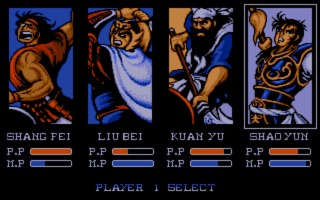
Dynasty Wars and Last Duel: Inter Planet War 2012 are a couple of Arcade games I covered in the very last ST-urday feature of 2015. I've been sprucing up games pages simultaneously with writing the ST-urdays they pertain to, but I've fallen a bit behind with no small blame going to the fact that I featured a whole five games in that final week for my ongoing love-letter to the Atari ST home computer. I'm intending to finish off the other three this week. Dynasty Wars also put me on a tangent building up the Tenchi o Kurau franchise page - the game's Japanese name and the name of the historical manga the game is based on - because it turns out Tenchi o Kurau (which translates to the badass title "The Devouring of Heaven and Earth") was also the inspiration source for Capcom's Three Kingdoms Era NES RPG Destiny of an Emperor. Both Dynasty Wars and Destiny of an Emperor saw sequels: the CPS-1 Arcade brawler Warriors of Fate and the Famicom RPG Tenchi o Kurau II: Shokatsu Koumei-den (the one game in this set of four to not see an international release) respectively. I hadn't realized there was a connection until now beyond being Capcom games, but I guess if you bought the license why not use it as much as you can?
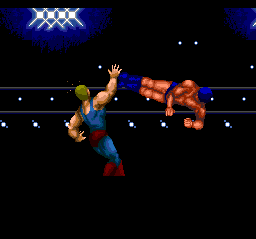
I've also gone back to my PC Engine '90 to-do list, fixing up the pages for the Osamu Tezuka anime license platformer Aoi Blink (which I covered in an episode of TurboMento-12 years ago) and the rotational shoot 'em up Barunba while creating new pages for soccer game Formation Soccer: Human Cup '90, which began a series that would later take off on the Super Famicom/SNES as Super Formation Soccer, and Maniac Pro Wrestling, which looks to be an entertaining (if you can read Japanese) pro-wrestling game that focuses largely on menus and dramatic cutaways of sweet wrestling moves. Four games in a week is very slim progress, but I hope to get back into the swing of things soon and endeavor to complete the rest of the PC Engine's 1990 library by the end of February. Then it's back to Super Nintendo games for probably the rest of the year. Fun!
Fallout 4!
I've exhausted almost everything I want to say about Fallout 4, but there is a significant part of the end-game that is based on the world's factions. As with Fallout: New Vegas, the are a few groups vying for control over the game's region that the player can choose to ally with. During the early stages of these faction helping quests, you can pull a Yojimbo and play both (or all four, in this case) sides against the middle and decline to kill or firmly align with anyone, but that only gets you so far. To discuss what happens after that point of no return would be to get into end-game spoilers, so I'll continue that in just a little bit with a spoiler-blocked section for those squeamish about such things.
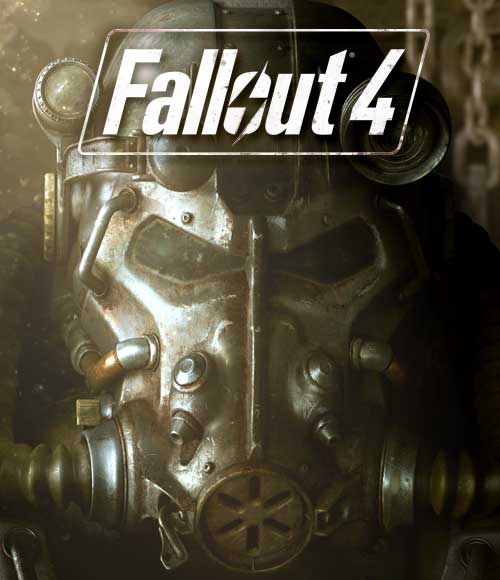
Instead, I'll talk about the factions themselves in more general terms. The chief issue is that the four factions aren't necessarily ideologically opposed to one another. The game tries to set it up that way, but there's a considerable amount of guile and wiggle-room that it refuses to account for because it demands the player make a choice between the four of them as the game lumbers towards its conclusion. I was someone who managed to resolve the New Vegas conclusion with very little bloodshed in part because I'd garnered a lot of respect from the factions in questions after helping them with story and radiant (the game's word for repeatable quests that randomly selects from a pool of locations to either clear our or acquire items from) missions and because I'd increased my speech skill. I love mediating my way through problems in games like this, using my wits and charisma (or that of my character, at least) to find a peaceful solution, or at least a solution that is more gratifying than a giant gunfight followed by what often feels like an arbitrary and incongruous final boss encounter. Fallout 4 is very much set on the latter scenario, alas, though I'll not go into details yet.
What's worse is that there's no "faction affinity" rating in Fallout 4: if you perform radiant quests for a group, it earns you practically nothing but the XP and whatever you found there. The important faction quests are triggered purely by where you are in the story instead. Like the settlement crafting, it feels as if Bethesda had hurried through that aspect of the game quickly to get Fallout 4 shipped as soon as possible, but unlike settlements - which have an excuse for being underbaked as they were an almost entirely new feature for Bethesda's open-world games, the Skyrim Hearthfire DLC notwithstanding - there's no excuses for why this pre-existing aspect felt so lackluster. You're almost better off ignoring all the factions until they become integral to the story for what little they offer, and there's no quest line you can follow for any one of them that won't eventually permanently block off another - while it might be a little hard to swallow that your Dragonborn can be Skyrim's Archmage, Thief Guild Master, Harbinger of The Companions and Listener of the Dark Brotherhood at the same time, at least you could pursue all those quest chains in a single game.
Citizens of Earth!
As with Fallout 4, I've all but exhausted every discussion topic about Eden Industries's Indie JRPG throwback Citizens of Earth already thanks to the three rundowns I penned during Go! Go! GOTY! last month. I do have one last element to discuss in how effectively the game gives each of its forty recruitable characters their own personality, combat style and exploration ability - some of which begin to play around with meta elements of the game's UI and mechanics - but if you'd rather they remain surprises then I'll recommend you read those spoiler-free Go! Go! GOTY! entries or watch the site's early-game Quick Look and decide for yourselves whether or not you want to play it before reading any further. I will say that, after completing the game, it is absolutely worth the time investment and is still worthy of its top-ten position on my GOTY list for last year. I'd rate it as highly as Zeboyd's best for how inventive it can be and how evident its love is for the JRPGs that inspired it.
Speaking of its inventiveness, let's quickly run down that list of recruits and what they can provide you in the field. For the sake of brevity, we won't go into their combat style or recruitment methods, but even if the game scales down Suikoden's 108 Stars of Destiny to just 40 civic-minded citizens, it still finds a considerable number of applications for them:
I'd say the emphasis on distinctive characters - if only in a gameplay sense, as most are one-joke archetypes built around their particular occupation - are the game's greatest strength: where Suikoden's cast of characters might offer useful services back at the player's headquarters or become valuable members of the player's party during battles, rarely do they perform both functions. Every character in Citizens of Earth, meanwhile, offer something to the player's three-person party should it be configured in such a way to need a linchpin tank, healer, buffer, DPS or what have you as well as non-battle abilities that range from vital to convenient to treasure-hunt enabling to providing extra questing to messing around with the game's settings. I'd like to see what a sequel might do with its next group of eccentric nine-to-fivers.
That's another breezy Sunday update in the bag. What are you guys looking forward to playing this week? I feel like my gaming palette's been cleansed with Fallout 4 and Citizens of Earth finally complete after spending weeks on both. Right now, I'm thinking of playing something a little more active...
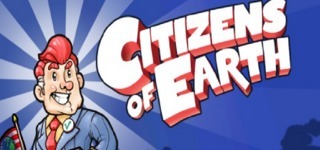
Log in to comment